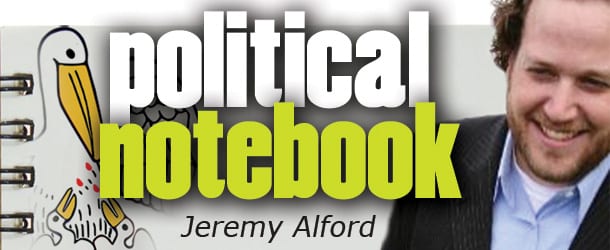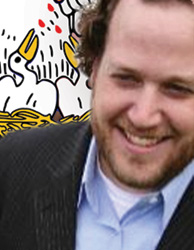Two new polls from the University of New Orleans’ Survey Research Center and LSU’s Public Policy Research Lab reveal that the public has serious concerns about the budget and the direction the state is heading as the Legislature launches into its second session of the year. In the automated UNO poll, Gov. John Bel Edwards’ favorability seems to be improving — 43 percent of survey respondents found the governor favorable, while 34 percent found him unfavorable, compared to a 34-44 split just three weeks earlier. Edwards definitely fared better than the state Legislature, which received a 15 percent favorability rating, and a 53 percent unfavorable. Whether people are actually paying attention to the financial fights at the Capitol, 79 percent believe the state’s budget is in crisis, while 11 percent don’t think there’s a budget crisis and 10 percent don’t know. Also, nearly 49 percent blame the perceived crisis on former Gov. Bobby Jindal; 24 percent blame the Legislature and 3 percent point a finger at Edwards. In the LSU poll, nearly two-thirds of Louisiana residents — 63 percent — think the state is heading in the wrong direction. That’s the most who feel this way since the survey group began tracking opinion in 2003. The share of respondents who name the state’s budget as the most important problem jumped from 7 percent in 2015 to 26 percent this year. The UNO poll surveyed 631 active registered voters with automated questions on March 13. There was a +/-3.9 percent margin of error. The LSU poll was conducted live Feb. 1-26, with both landline and cell phone respondents, and with a margin of error of +/- 3.1 percent.
Tax Giveaways On Table
The Senate Revenue and Fiscal Affairs committee has been reviewing dozens of tax credits, exemptions and rebates at its meetings during the ongoing regular session. But any legislation to change them may have to wait until the 2017 session, or a possible second special session this year — whichever comes first. Revenue and Fiscal Affairs Chair J.P. Morrell, D-New Orleans, said the committee is evaluating how effective each tax law has been. When it comes to tax credits, that means finding the rate of return on investment and comparing the cost to the state in lost tax revenue to the value the tax credit brings to the economy. For exemptions and rebates, it means comparing the amount of money the law was intended to save to the money actually brought in. Morrell cited the utility sales tax exemption as an example of how outside circumstances can change a credit’s effectiveness. “When [the credit] was passed, the price of crude oil was very high, and it was intended to give relief to the energy industry,” Morrell said. “Now, oil is very low and it has become lagniappe; it has become free money.” In addition to rolling back tax credits to raise state revenue, Morrell said the meetings would give the committee an opportunity to seek out ways to fix broken credits, or, when they’ve been effective, expand them. The Louisiana Dept. of Revenue (LDR) and other agencies are providing the committee with data about how often credits are claimed and how much they’re costing the state. LDR released the 2015-16 Tax Exemption Budget early in March, listing the content and cost to the state of 400 tax credits. The amount of money involved with the credits adds up to $8.2 billion in lost revenue annually for the state. Keep in mind that the list of tax credits being studied is not exhaustive. Just finding all the credits, rebates and exemptions peppered throughout the laws has been a struggle, Morrell said. “Some of these are so archaic and obscure, we’re still finding new ones,” he said. With more than 400 laid out, the committee split them up by subject matter. Morrell said they’ll hear testimony on at least 10 per meeting, but may hear testimony on up to 30 to 40 credits on some days. In related news, a task force that was established during the special session to target structural tax and budget reforms for the 2017 fiscal session has been filled out and is already meeting to draw up legislative proposals. The Task Force on Structural Changes in Budget and Tax Policy has met twice so far. (It’s set to meet once a week.) Right now, it’s primarily reviewing the current tax code and how changes from the last two sessions will impact it and incoming revenue.
Edwards’ Pay Agenda Opposed
On the opening day of the regular session, Edwards said he wanted to attack poverty by hiking the minimum wage. “Paying our workers a living wage is a basic principle in a land of opportunity,” he said. “$7.25 per hour is simply not a living wage in 2016.” He called for a “modest increase” that would be passed in over the next two years, with a minimum wage of $8 per hour beginning in 2017, then going to $8.50 in 2018. He noted 14 other states kicked off the New Year with increased minimum wages. Equal pay for women is another component of his plan. “Single mother households account for the majority of Louisiana families living in poverty and over half of our low income families,” the governor said. On the Senate side, Labor and Industrial Relations Chairman Neil Riser, R-Columbia, expressed doubt that the proposals will move. “I don’t think I can support that,” he said. On the House side, Republicans on the labor counterpart committee outnumber Democrats 10 to seven, although Chairman Patrick Jefferson, D-Shreveport, has supported measures similar to those proposed by Edwards in the past. Dawn Starns, state director of the National Federation of Independent Business, is planning to fight the proposals. “NFIB is asking the Legislature to push back against Gov. Edwards’ overreaching policies that would create additional hardships for Louisiana’s job creators,” she said. “We need lawmakers to look for ways to help small businesses grow and create jobs and lead Louisiana’s economy back to solid ground. We can’t afford for legislators to put politics ahead of common sense.”
New Names Hover Over Senate Race
As well defined as the field is becoming for the U.S. Senate race this fall, there are still some politicos sitting on the fence who could influence the contest. The latest is Abhay Patel, an economic development professional from New Orleans, who is being encouraged to run. The LSU grad is a former Wall Street investment banker who, at one time, raised in excess of $30 billion for transactions such as Hertz’ acquisition of Dollar Thrifty. Patel, a Republican, would be a first-time candidate. He’s currently the vice president of business development for the New Orleans Business Alliance. There’s also quadriplegic activist and attorney Derrick Edwards, likewise from New Orleans, who is officially a candidate and is only starting to campaign. Meanwhile, Democrat Josh Pellerin, president and CEO of the Pellerin Energy Group, has engaged a firm to file his federal paperwork for a run in the U.S. Senate race, according to sources familiar with his developing campaign. Key staff, including a fundraising consultant, are being lined up. Pellerin could fund his bid by himself if he needed to, but he has some high-profile friends. During Washington Mardi Gras, Pellerin met with President Barack Obama. State Rep. Paul Hollis, R-Mandeville, is thinking about the Senate, as is GOP Public Service Commissioner Eric Skrmetta of Metairie and Democratic state Sen. Gary Smith, Jr., of St. Charles Parish. The Democratic Public Service Commissioner Foster Campbell and Denham Springs attorney Caroline Fayard have announced. On the Republican side, Treasurer John Kennedy, Congressman Charles Boustany, Congressman John Fleming, Retired Air Force Col. Rob Maness and former Congressman Joseph Cao, a Republican, of New Orleans are candidates. Former legislator Troy Hebert, who would run with no party affiliation, is expected to run.
Senate Forum Previews Campaign Themes
The Police Jury Assoc. recently hosted a U.S. Senate forum that offered an early preview of what the leading candidates will be talking about on the campaign trail and which candidates are likely to bump heads first. On the Democratic side, Public Service Commissioner Foster Campbell stuck to the issues he’s best known for. He renewed his focus on tackling poverty by raising the minimum wage and promising to make policy through the prism of low- and moderate-income families. He called for oil companies to start paying more of a fair share and criticized “tap-dancing politicians.” He also mentioned that Gov. John Bel Edwards asked him to run. “I’m glad he has and I’m taking him up on it,” Campbell said. “If you don’t vote for me, you’re going to be making a hell of a mistake.” Denham Springs attorney Caroline Fayard told the crowd she is indeed a Democrat, but one that is pro-life and pro-gun. She said she’s “not a liberal, nor a socialist,” but rather a “happy capitalist” who “loves America.” She stressed her business background and was critical of “people who keep running” for office. Fayard also debuted what might become a running tagline: “I’m a workhorse, not a show pony.” On the Republican side, Treasurer John Kennedy said he’s trying to “take our country back” from the “political elite in Washington, D.C.” He spoke about being a champion of the middle class, and hit his usual fiscal hawk notes. Congressman Charles Boustany shared his family background and said he was “furious” about the direction of the country. The frustrations of voters was a recurring theme in his speech. He also discussed his focus on reforming the Internal Revenue Service and fighting Obamacare as a congressman. Veterans’ issues were hit upon as well. Congressman John Fleming said he doesn’t know who he will vote for in the presidential race, but said he’ll likely gravitate toward the candidate who promises the least. He attempted to strike an anti-establishment chord. “I’m fed up with my own party,” he said before explaining his role with the Freedom Caucus. He largely hit upon such issues as welfare, a repeal of Obamacare and entitlements. These issues position him to the right of the field. Retired Air Force Col. Rob Maness is staking out the same ground. He told the crowd he believes in individual responsibility and limited government, then pulled a small copy of the Constitution out of his pocket. Describing himself as “the outsider,” Maness vowed to work as a senator to strengthen America’s military and secure the border. Former Congressman Joseph Cao, a Republican, of New Orleans, and former legislator Troy Hebert, who would run with no party affiliation, are expected to run as well, but didn’t participate in the forum.
Chairmanships And Party Politics
Sen. Karen Carter Peterson of New Orleans is not only the chairwoman of the Louisiana Democratic Party, but is also the chair of the Senate and Governmental Affairs Committee, which has oversight of the laws governing the state’s political parties. So, is there a conflict? Peterson, in her legislative role, may have to oversee hearings about party primaries, party registration and related issues. If a conflict does arise, Peterson said she’ll step aside and allow Vice Chair Wesley Bishop, D-New Orleans, to swing the gavel. “If there’s even the perception of a conflict, I won’t be involved,” she said.
Illinois Has Warning For Bayou State
If there are any doubts that not solving the budget problem in Louisiana will create an epic headache, look no further than Illinois for proof. The governor and lawmakers there are in the midst of an eight-month budget battle. Moody’s Investors Service has downgraded the credit rating of three of the state’s public universities, which haven’t seen any funding at all from the state since last summer. There was also a brief stint when Illinois Lottery winners weren’t being paid. Ticket sales plunged. Additional reporting for this column by Gordon Brillon. For more Louisiana political news, visit www.LaPolitics.com or follow Jeremy Alford on Twitter @LaPoliticsNow.














Comments are closed.